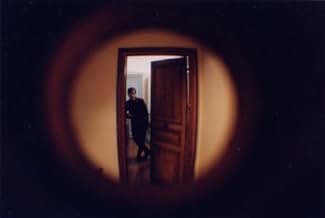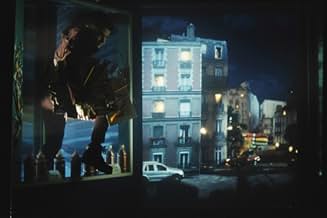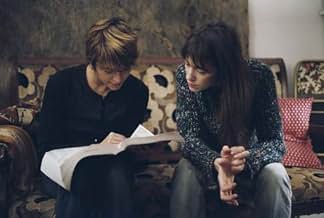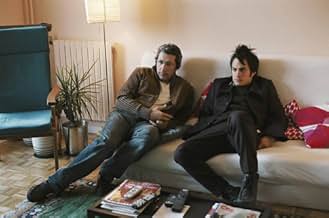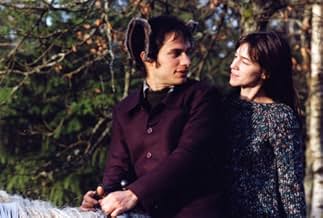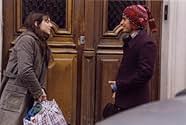La science des rêves
- 2006
- Tous publics
- 1h 45min
NOTE IMDb
7,2/10
72 k
MA NOTE
Un homme envoûté par ses rêves et son imagination est amoureux d'une Française et sent qu'il peut lui montrer son monde.Un homme envoûté par ses rêves et son imagination est amoureux d'une Française et sent qu'il peut lui montrer son monde.Un homme envoûté par ses rêves et son imagination est amoureux d'une Française et sent qu'il peut lui montrer son monde.
- Réalisation
- Scénario
- Casting principal
- Récompenses
- 7 victoires et 9 nominations au total
Alain de Moyencourt
- Gérard
- (as Decourt Moyen)
Avis à la une
This movie had a lot going for it. The art direction was incredibly fun and creative, and overall the movie looked great and had a very unique vision. It was cute and quirky and definitely made me laugh out loud at times while at other times it made me feel awkward and tense in the best possible way.
The dream sequences were fun and blended with reality in a very seamless and engaging way (though on a personal level I prefer the way dreams were portrayed in Waking Life). And while on the surface the love story was thoughtful and true (and I could even relate to it in some ways), the problem for me was that I just couldn't sympathize with Bernal's character, Stéphane. I couldn't really see where Gainsbourg's character, Stéphanie, was coming from either. While their interaction was at times endearing, I just didn't feel like I had to root for them. Still though, there was enough charm in this movie that that fact didn't ruin the movie for me.
The dream sequences were fun and blended with reality in a very seamless and engaging way (though on a personal level I prefer the way dreams were portrayed in Waking Life). And while on the surface the love story was thoughtful and true (and I could even relate to it in some ways), the problem for me was that I just couldn't sympathize with Bernal's character, Stéphane. I couldn't really see where Gainsbourg's character, Stéphanie, was coming from either. While their interaction was at times endearing, I just didn't feel like I had to root for them. Still though, there was enough charm in this movie that that fact didn't ruin the movie for me.
I just saw this at the Sundance Film Festival and feel compelled to saw a few things about the flick. This movie is so insanely good and just plain insane at the same time. The movie follows Gael Garcia's character as he moves back to his mothers home in Paris and finds himself falling for the girl across the hall. Gael's character experiences reality through dreams and the present, creating all sorts of confusion. The movie has some of the most unique props and eccentric animation pieces I have ever seen, but would you expect anything less from Gondry (Eternal Sunshine..). This movie really can't be described in truth but holds so much potential for multiple viewings as its so full of life and visual wonders for the eyes. Gael Garcia is just perfect in this role and is fascinating in gesture and laugh out loud funny when the script allows. I think you should definitely look forward to seeing this movie when it gets a wide release, its funny, its art, its pleasure for the eyes and a puzzle for the mind.
Director Michel Gondry continues his exploration of the world of dreams, this time without the master writing of Charlie Kaufman who authored the script of 'Eternal Sunshine of the Spotless Mind'. Taking upon himself the writing of the story and setting it in an every day Parisian setting Gondry succeeds quite well to continue on the same line of dreams taking over the real world. Here he brings to screen a very direct and simple love story between two young people living half in reality, half in the world of dreams of the principal character. Stephane (Gael García Bernal) is a Mexican young fellow visiting his mother and trying to accommodate with a boring job. He is less living in the real world and more in a world of fantasy where he is trying to find place for his neighbor Stephanie (Charlotte Gainsbourg) he falls for.
The very simple and direct story has an overall air of freshness, resulting from acting, but especially from the very warm and almost childish approach to the world of dreams put together by Gondry. His surrealistic space has nothing threatening, no shades or sharp lines as in Dali or De Chirico's paintings no hidden threats as in Hitchcock or social pressure as in Bunuel's movies. It is rather the world of childish cartoons, a low-tech and benevolent space of a prolonged childhood. If we are to trace the roots I would rather go back to the innocence of the characters in Boris Vian's 'L'Ecume des Jours.
I do not know if Gondry will continue his exploration of the world of dreams in future films, but with the two movies in this thematic space he already left a print of his own in a different type of cinema I would call cinema of dreams. From several points of view, because of the sincerity and freshness of the narration I liked more 'La Science des Reves' than the stars-stricken 'Eternal Sunshine of the Spotless Mind'.
The very simple and direct story has an overall air of freshness, resulting from acting, but especially from the very warm and almost childish approach to the world of dreams put together by Gondry. His surrealistic space has nothing threatening, no shades or sharp lines as in Dali or De Chirico's paintings no hidden threats as in Hitchcock or social pressure as in Bunuel's movies. It is rather the world of childish cartoons, a low-tech and benevolent space of a prolonged childhood. If we are to trace the roots I would rather go back to the innocence of the characters in Boris Vian's 'L'Ecume des Jours.
I do not know if Gondry will continue his exploration of the world of dreams in future films, but with the two movies in this thematic space he already left a print of his own in a different type of cinema I would call cinema of dreams. From several points of view, because of the sincerity and freshness of the narration I liked more 'La Science des Reves' than the stars-stricken 'Eternal Sunshine of the Spotless Mind'.
Michel Gondry, the visually creative giant behind some of MTV's most stylistically innovative music videos, and more recently the driving force behind his and script writer extraordinare Charlie Kaufman's brilliant Eternal Sunshine of the Spotless Mind, finally makes his solitary debut, choosing to write and direct this surrealist tale of dreams, reality, and the lines some people walk between them. Fans of the visual virtuoso must have been anticipating Gondry's official declaration as auteur for some time, having salivated for a decade now as this French director continually pushed the envelope for lucky musicians.
I'm sure many saw The Science of Sleep as a proving ground that would help fans see if the eccentric director would be able to parlay all of these visually creative aspects into a more cohesive, cinematic experience. By and large, the dangerously imaginative movie succeeds on it's own, though there are a few discrepancies to note. First, it does feel that much of the way the movie is shot, in particular the scenes which stay most grounded in reality, do mimic a lot of the production values that gave Eternal Sunshine such a realistically detached value to it. Ditto with much of the stream-of-consciousness script, at times heavily emulating the flow Gondry and Kaufman helped pioneer the first time around. The actual plot is decidedly low-key, and for good reason, though at times Gondry does struggle to fill all of his microcosms with relevance. To say these values remain derivative and do not completely complement the whimsically dark storytelling taking place here though, would be to forsake the fantastic and singular joy that the Science of Sleep is.
Regardless of it's constant French avant-garde noodling, and despite the obvious parallels to Gondry's previous film, Science remains a near-masterwork, punctuated by the intoxicating rhythm of it's perceptive dream sequences, often edited with the most keen of intentions. Whether viewers will stay immersed throughout the fantasy bleed-in will be up to ones subjective threshold, and ones ability to thrive off of the magically deranged pacing that hints at underlying psychological relevance. Gondry's masterful pacing does not disappoint, culminating with the brilliant evolution of the script's supremely playful tone into something much more serious.
Of course, the sincere material would only be at home when recited by actors of a pure heart, and in this Gondry also excels by casting two leads who do everything they can to involve us in the realist fantasy. Gael García Bernal, always doing well to pick good material, finally slips into an English language role with the ease I would expect, and the luminous yet subdued Charlotte Gainsbourg radiates the earthly kind of magic that this film is all about. People with strict objective agendas stay clear, anyone else who still uses an inkling of their imagination, please dive in. It may not be perfect, but Science is surely one of the most unique and perceptive fantasies to merge with the mass consciousness in years.
I'm sure many saw The Science of Sleep as a proving ground that would help fans see if the eccentric director would be able to parlay all of these visually creative aspects into a more cohesive, cinematic experience. By and large, the dangerously imaginative movie succeeds on it's own, though there are a few discrepancies to note. First, it does feel that much of the way the movie is shot, in particular the scenes which stay most grounded in reality, do mimic a lot of the production values that gave Eternal Sunshine such a realistically detached value to it. Ditto with much of the stream-of-consciousness script, at times heavily emulating the flow Gondry and Kaufman helped pioneer the first time around. The actual plot is decidedly low-key, and for good reason, though at times Gondry does struggle to fill all of his microcosms with relevance. To say these values remain derivative and do not completely complement the whimsically dark storytelling taking place here though, would be to forsake the fantastic and singular joy that the Science of Sleep is.
Regardless of it's constant French avant-garde noodling, and despite the obvious parallels to Gondry's previous film, Science remains a near-masterwork, punctuated by the intoxicating rhythm of it's perceptive dream sequences, often edited with the most keen of intentions. Whether viewers will stay immersed throughout the fantasy bleed-in will be up to ones subjective threshold, and ones ability to thrive off of the magically deranged pacing that hints at underlying psychological relevance. Gondry's masterful pacing does not disappoint, culminating with the brilliant evolution of the script's supremely playful tone into something much more serious.
Of course, the sincere material would only be at home when recited by actors of a pure heart, and in this Gondry also excels by casting two leads who do everything they can to involve us in the realist fantasy. Gael García Bernal, always doing well to pick good material, finally slips into an English language role with the ease I would expect, and the luminous yet subdued Charlotte Gainsbourg radiates the earthly kind of magic that this film is all about. People with strict objective agendas stay clear, anyone else who still uses an inkling of their imagination, please dive in. It may not be perfect, but Science is surely one of the most unique and perceptive fantasies to merge with the mass consciousness in years.
10filman79
This is a perfect example of a love-it-or-hate-it movie simply because its very nature means it's somewhat plot less -- we're constantly unsure if what we're seeing on the screen is really real or just in Gael Garcia Bernal's dreams, and some moviegoers abhor uncertainty, hence I think the large number of "1" votes for this flick. (Also, the film is ostensibly foreign, but moves from French to English with equal measure, with a little bit of Spanish tossed in, too. So maybe the shifts in language also irked some people, but I found it enchanting.) So don't let those low votes fool you; this is a beautiful, sublime film, and if you let yourself go onto its wavelength, you'll most likely find yourself *enjoying* the (perhaps unsolvable) visual puzzle Michel Gondry has created here. It is the quintessence of magical realism, and yet everything comes across as absolutely effortless, unlike the forced whimsy of, say, last year's Charlie and the Chocolate Factory or the too-clever-by-half Adaptation. I dare say it's probably one of the best films of the year.
Le saviez-vous
- AnecdotesAt the 2006 Berlin Film Festival, director Michel Gondry told that the main location of the film is a house where he used to live 15 years ago.
- Versions alternativesThe French DVD edition present a alternate version of the film made of B-roll footage.
- ConnexionsEdited into La science des rêves - Film B (2007)
- Bandes originalesIf You Rescue Me
(adaptation from "After Hours")
Written by Lou Reed
Adaptation by Jean-Michel Bernard
(c) Oakfield Avenue Music Ltd / Screen Gems - EMI Music Inc.
Additional lyrics by Linda Serbu (as Miss Linda Colleen Serbu)
By permission of EMI Music Publishing France SA
All rights reserved
Meilleurs choix
Connectez-vous pour évaluer et suivre la liste de favoris afin de recevoir des recommandations personnalisées
- How long is The Science of Sleep?Alimenté par Alexa
- What Language Is This Film In?
Détails
Box-office
- Budget
- 6 000 000 $US (estimé)
- Montant brut aux États-Unis et au Canada
- 4 670 644 $US
- Week-end de sortie aux États-Unis et au Canada
- 347 925 $US
- 24 sept. 2006
- Montant brut mondial
- 15 116 179 $US
- Durée1 heure 45 minutes
- Couleur
- Mixage
- Rapport de forme
- 1.85 : 1
Contribuer à cette page
Suggérer une modification ou ajouter du contenu manquant

Lacune principale
By what name was La science des rêves (2006) officially released in Canada in French?
Répondre


